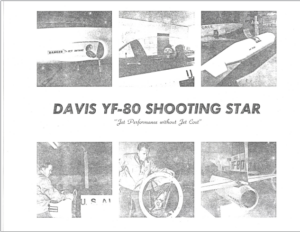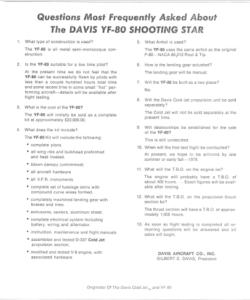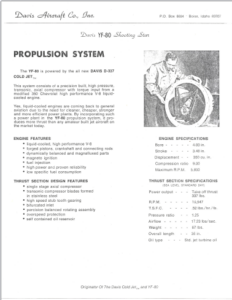When I was in my youth in Idaho, I went to the Western Idaho Fair, always in the end of August it had to be 1978 as the art work from the brochure denotes 1977 on one of the pages. And saw the Davis YF80 Shooting Star.
The Davis YF80 was 50% scale model of the F80 Shooting Star. At that time there were no mini turbine engines on the market, that being 50 years ago, that facet of the home built market has indeed changed drastically. But back then Davis planned to use a Chevy V8 turning a rather low speed turbine, 5,800 rpm out putting out an estimated 300 pounds of thrust.
Lets be fair, this was my first exposure to the homebuilt aircraft scene , through this I heard about the EAA, and the whole homebuilt world that was just a few years away from an actual growth explosion due to certain court decisions (Thanks Cessna) and ironically I lived in Southwest Idaho, home to Kitfox, Avid, Helicycle (in its initial existence) and Davis Aircraft, and literally a dozen others off and on through the 80’s & 90’s.
Sadly this project did not see fruition and died like so many interesting homebuilt designs, As for Davis Aircraft the Owner went on to a flying wing design that made the cover of Kit Planes, but sadly he put it into a rocky field on the back side of the State school and Hospital in Nampa, where Mr. Davis broke his back. After that the company kind of disappeared and I never heard of them after that.
Now below is the scan in of the brochure packet I got at the 1978 Western Idaho Fair where Davis Aircraft had a booth and the full scale mockup on display.
Here’s the brochure:




